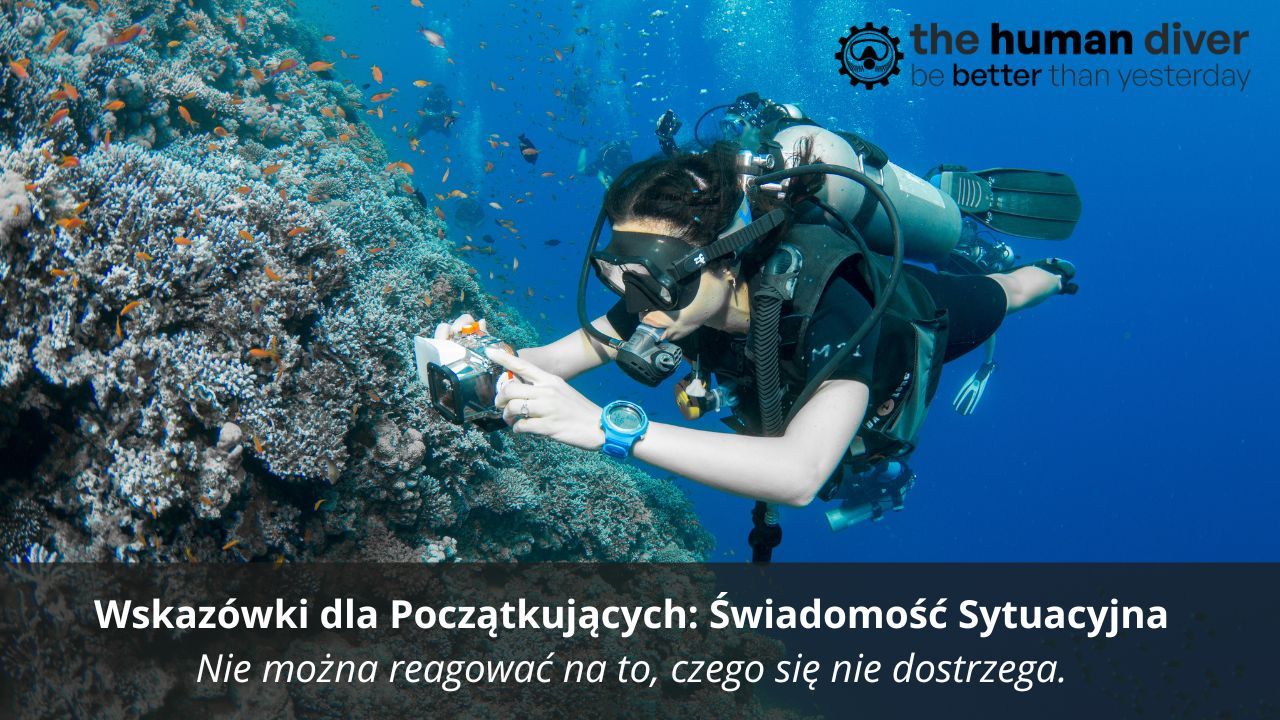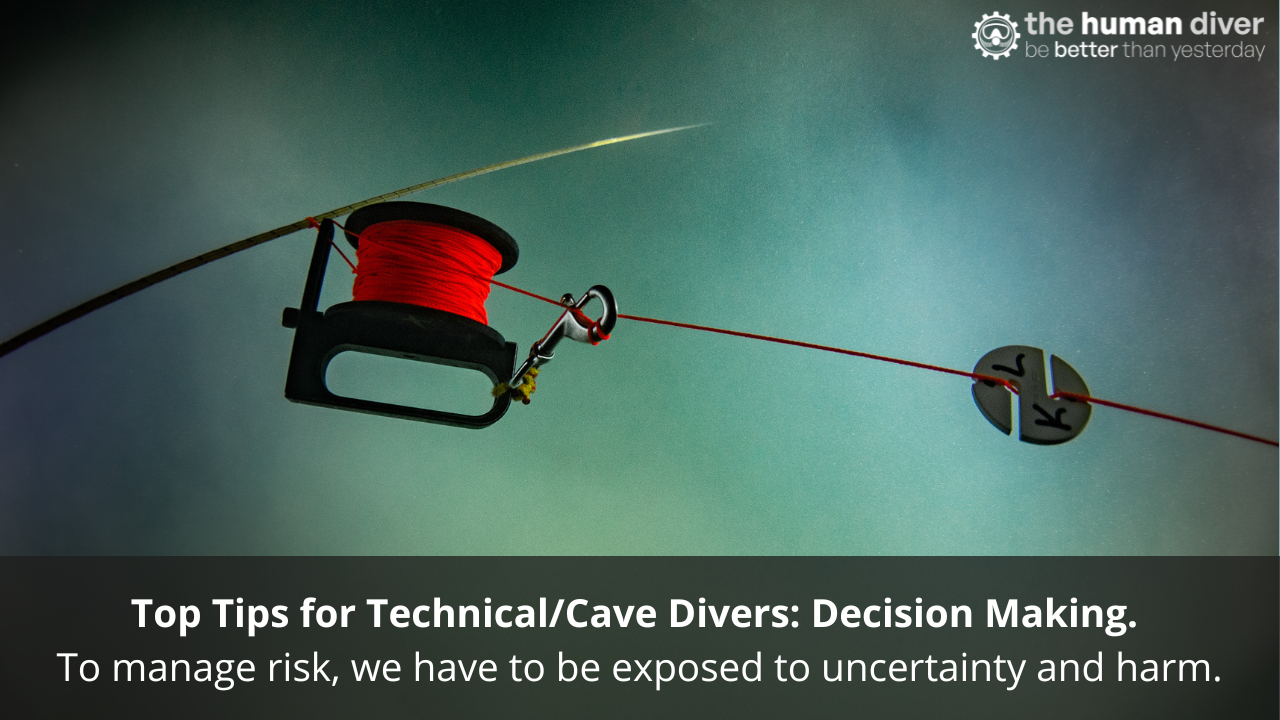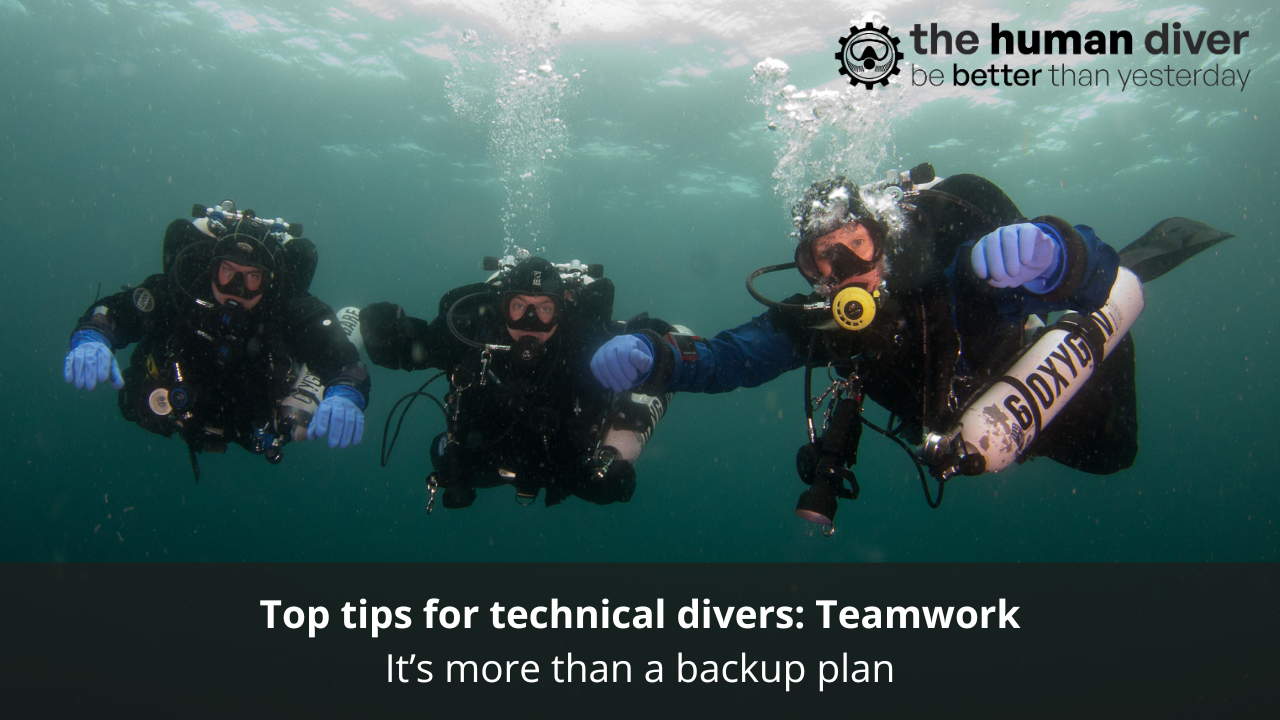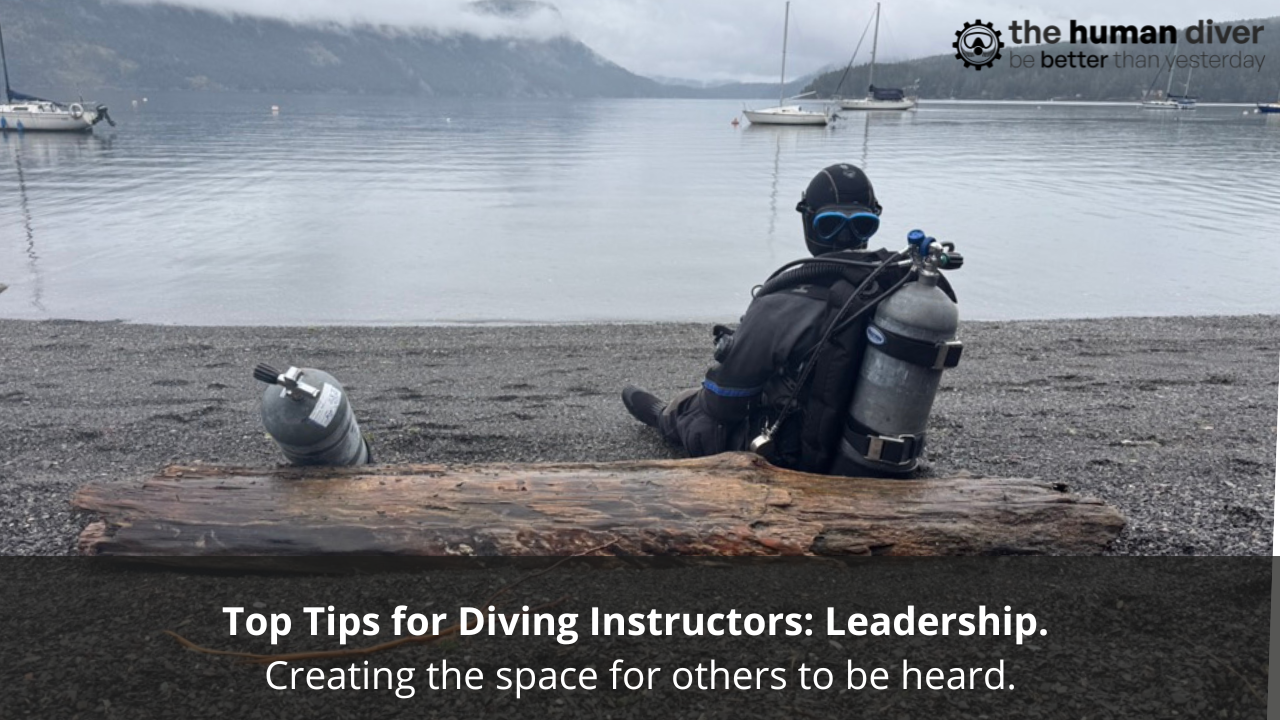
Human Factors in Diving. What it is. What it isn’t. Why you need to know.
Aug 27, 2023Human factors, at its simplest level, is designing, deploying, and refining systems that make it easier to do the right thing and harder to do the wrong thing. That ‘thing’ can be many different things, and they are often interdependent:
- delivering a theory session in a training class and the students understand the tools/concepts.
- assembling and using a closed-circuit rebreather so that errors are minimised or trapped and designing and deploying a checklist to achieve that.
- understanding why divers don’t analyse gas even though we regularly have accidents involving the wrong gas being breathed.
- instructors creating an environment where it is okay to ask questions by developing psychological safety.
- developing divers and instructors who understand the concepts of leadership and followership and can put them into practice.
- designing training materials that are engaging and are focused on the student.
- developing standards at a regulator/organisational level that will be more likely to be followed.
- understanding an adverse event so that learning, not blaming happens, by understanding the systems nature of such events instead of focusing on the individual.
- creating a culture where reporting happens, and learning follows on from the structured analysis.

Human factors as a science has been around aviation and nuclear power since the 1970s and 1980s when there was a realisation that the pilot or plant operator wasn’t stupid despite the catastrophic outcome, but they were making sense of the situation they were in given the resources (physical and mental) to achieve the goals they were being rewarded for. These work environments had often been designed without addressing the limitations of human performance which included the limits of working memory, limited attention span, miscommunication, authority gradient, and confusion with displays and controls. This short video provides such an insight into the background.

Although the Human Diver started in January 2016 with the need to fill a perceived gap in knowledge and practice within the sports diving community, some elements of understanding HF have been around for some time. However, I would argue that they focused primarily on the proximal or local causes of incidents/accidents without looking further into the systems aspects of success and failure. Examples include:
- robust team diving protocols from the WKPP which then developed into the programmes of GUE, UTD, and similar.
- the accident analysis of Sheck Exley who developed ‘A Blue Print for Survival’ for the cave diving community.
- the work of BSAC and DAN with their incident reporting systems although these primarily focus on outcomes or medical causes, respectively, rather than human factors influences.

Human factors is a large topic. This image from research into HF in railway operations (Moray, 2000) shows the nested perspective where individual factors are influenced and shaped by much wider organisational, national, and cultural aspects. Often HF is perceived to focus on the individual behaviour, physical ergonomics, and some team or group behaviours.

The aviation community have used a framework called SHELL which is shown below, and shows the interdependent nature of the factors which involve the ‘liveware’ (L, the human) and how they interact with the systems they are in. H refers to hardware (equipment & technology), E refers to the physical Environment, S refers to software (paperwork, processes, and systems) and the second L refers to other people (teams and organisation).

What do people think Human Factors is?
The following four topics are from blogs by Steven Shorrock, a world-renowned HF expert, that look at four different ideas of HF what is. You can find the detail at this link which is the first of the four blogs. The headings and summary are below.
- ‘The Human Factor’ –relates to the psychology of humans, agency, and intention.
- ‘Factors of Humans’ – focuses primarily on human characteristics.
- ‘Factors affecting Humans’ – refers to the internal and external factors which impact human performance.
- ‘Socio-technical System Interaction’ – covers how people interact within and with the systems and operational/social/technical environments.
In a survey which was part of an ongoing research project, the following answers were given by 670 respondents to the question “What does the term 'human factors' in diving mean to you?” This diversity highlights an educational challenge, likely one that exists in many other domains too. If we don’t have a common language, it is easy to see why misunderstandings happen.

What ‘Human Factors in Diving’ isn’t
During my presentation at Rebreather Forum 4.0, I made reference to the above and also what Human Factors isn’t. Some of the topics below come from another series of blogs by Steve. If we want to focus on developing the knowledge and practice within the diving community, understanding what HF isn’t should be considered as important as knowing what it is.
- Common sense – common sense is a shared understanding of a certain process, task, or outcome between a certain group or community and is developed over time, often through trial and error. In of itself, it does not exist as a ‘thing’.
- Courtesy and civility at work – being civil is a ‘decent’ human activity.
- Crew Resource Management (CRM)/Non-Technical Skills (NTS) – these tools and concepts were developed in the aviation sector in the 1970s following a number of seminal events e.g., Tenerife, United Airlines 173, and the Kegworth disaster. They initially related to communication and assertion in the cockpit but have evolved into creating a shared mental model between operators in a complex adaptive system and dealing with expected threats and ways in which are more likely to happen.
- A Cause of Accidents – it is easy to attribute ‘human factors’ as the cause of an accident if we take a linear approach to accident causation e.g., lack of situation awareness, miscommunication, or fatigue. However, modern safety science has identified that we construct the causes of accidents based on our perspective. Healthcare, in the past, has confused HF with CRM but has now recognised the need to take a wider systems view, especially when it comes to incident investigation and analysis.
- Checklists – checklists are an effective tool to reduce the likelihood of a human error. However, to be effective, they need to be designed with HF principles in mind (Building Checklists Blog 1, Building Checklists Blog 2), and deployed in a social environment that has been developed based on the acceptance of human fallibility. Healthcare has significant evidence to show the value of HF, but there are many socio-technical and organisational barriers to implementation, and implementing HF in diving is likely to be harder for many more reasons, not least the lack of organisational frameworks to mandate and monitor the application and development.

Non-Technical Skills – This is what The Human Diver primarily does
The Human Diver delivers education focused on non-technical skills, psychological safety, and a Just Culture. So why are the programmes called “Human Factors in Diving”? There is a history to that! In January 2016 when the first programme was run, it was called Non-Technical Skills for Divers. However, during class a number of the students asked what does this mean? “We have recreational diving, and we have technical diving, does that mean you’re going to teach us recreational diving skills…” so I changed the title of the programmes to Human Factors in Diving but am gradually moving back to non-technical skills as the level of knowledge within the community grows.
The topics we cover in the educational programmes are based around this framework

and the interdependence that exists between the non-technical skills, the impact of performance shaping factors/error-producing conditions, and the need for a Just Culture and the presence of psychological safety. We also touch on the concept that successful outcomes are not just because of non-technical skills and technical skills, but also need to consider the context and sometimes a bit of luck or randomness.
This is just too abstract…
I recently watched a presentation by Rich Walker on Human Factors and Team Development as part of the GUE Level 3 core programme. Rich made a number of very valid points concerning the abstract nature of HF in Diving and the need to talk specifics and give examples. This is something I have highlighted in the past: human factors is general in nature and specific in application. By this I mean that to put something in place to solve a problem, you have to understand the specific issue rather than provide a general solution. This is why I prefer answering specific questions during classes or online fora because they mean something to the question asker. If lots of specific answers are provided, it is easy to dismiss them as not relevant to the reader/listener or it takes more effort to move from one answer to the problem you face. Conversely, if general points are made, then they are dismissed as saying ‘we already do this or that’.

This need to focus on specifics highlights a problem for the diving industry – you need to know the topic before you can teach it. I recently sat down with some of the Human Diver instructors to develop a one-day classroom/in-water class that could be deployed by a training agency at the level of an AOW-equivalent diver or above. The student level course was relatively easy to define and develop, focusing on briefing, debriefing, decision-making, situation awareness, and close-loop communications. However, the amount of time needed to develop the instructors was likely in excess of anything a candidate instructor would likely invest if the training was to be more than just reading slides. I will spending time at DEMA with training agency staff trying to work out a solution to this…
The future…
None of the training agencies have an embedded or explicit HF or Non-Technical Skills programme. Some of their materials will cover some of the topics, but there are still many gaps. Individual instructors will supplement the course materials with their own knowledge but for HF, Non-Technical Skills, psychological safety and a Just Culture to be prevalent, it needs to be embedded in the agency materials and instructor updates. This is not an insignificant task. GUE has a 30-min programme within GUE.tv that covers some of these topics at a high-level, where you can view the first class here.
What I would like to do is work with the agencies to produce something like these documents which come from the Oil and Gas sector. They define what a ‘non-technical skills’ programme looks like, what it should contain, and how to deploy it.

Summary
HF in Diving is about making it easier to do the right thing, and harder to do the wrong thing in the context of diving, it is about understanding not just the individual behaviours, but also how it makes sense for divers, instructors, dive centre managers, and training agency staff to behave the way they do. They are not stupid, they are managing uncertainty and risk to achieve the goals they are being rewarded for – having a fun dive while on holiday, getting photos of an underwater experience, exploring a wreck or cave, or training a student to pass a class.
None of the training agencies have an explicit or embedded programme that covers non-technical skills or human factors in diving. Developing such a capability in-house is not an insignificant effort, especially given the training agency’s want/need to have unique content to set themselves apart from other agencies. I was once asked ‘Will adding HF courses to the agency increase the likelihood that a dive centre will move from another agency to our own?’ The simple answer is no. I fully understand the reasoning behind the question…agencies are there to make money and they need to find a way to be different. There isn’t a financial argument for safety and performance in diving given the standards that should be followed, therefore deployment of human factors and non-technical skills programmes is more about the ethics of safety.

Resources providing the evidence behind the value and need are available to download for free here https://bit.ly/rf4-resources
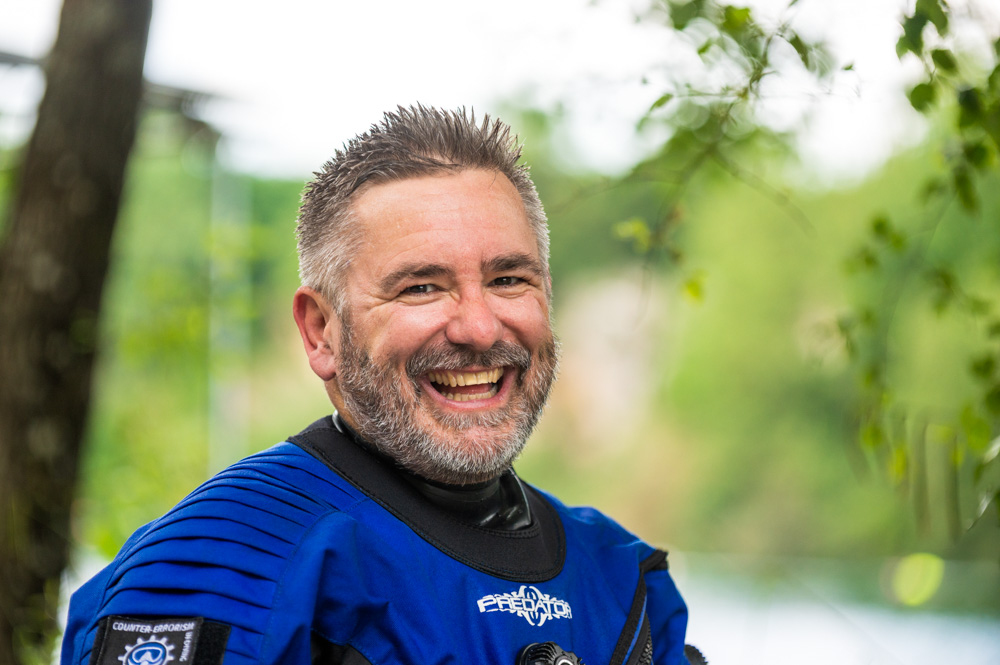
Gareth Lock is the owner of The Human Diver, a niche company focused on educating and developing divers, instructors and related teams to be high-performing. If you'd like to deepen your diving experience, consider taking the online introduction course which will change your attitude towards diving because safety is your perception, visit the website.
Want to learn more about this article or have questions? Contact us.





